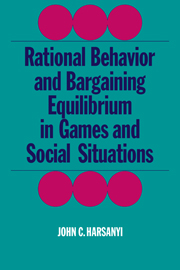Book contents
- Frontmatter
- Contents
- Preface
- Part 1 Preliminaries
- 1 Bargaining-equilibrium analysis: a new approach to game theory and to the analysis of social behavior
- 2 Rational-choice models of social behavior
- 3 Rational behavior under certainty, risk, and uncertainty
- 4 Morality and social welfare
- Part II General principles
- Part III Solutions for specific classes of games
- Notes
- References
- Index
3 - Rational behavior under certainty, risk, and uncertainty
Published online by Cambridge University Press: 24 November 2009
- Frontmatter
- Contents
- Preface
- Part 1 Preliminaries
- 1 Bargaining-equilibrium analysis: a new approach to game theory and to the analysis of social behavior
- 2 Rational-choice models of social behavior
- 3 Rational behavior under certainty, risk, and uncertainty
- 4 Morality and social welfare
- Part II General principles
- Part III Solutions for specific classes of games
- Notes
- References
- Index
Summary
Sure prospects and risky prospects
In Section 1.3 we briefly summarized the main results of individual decision theory (utility theory). In this chapter we will discuss these results in more detail. Recall that we speak of certainty when any action that the decision maker can take can have only one possible outcome, known in advance. We speak of risk or uncertainty when at least some of the actions available to the decision maker can have two or more alternative outcomes, without his being able to discern which particular outcome will actually arise in any given case.
More particularly we speak of risk when the objective probabilities (long-run frequencies) associated with all possible outcomes are known to the decision maker. We speak of uncertainty if at least some of these objective probabilities are unknown to him (or are not even well defined).
For example, I make a risky decision when I buy a lottery ticket offering known prizes with known probabilities. In contrast, I make an uncertain decision when I bet on horses or when I make a business investment, because in the case of horse races and business investments the objective probabilities of alternative outcomes are not known.
To describe the expected results of any given human action under certainty, risk, and uncertainty, we are introducing the concepts of “sure prospects”, “risky prospects”, and “uncertain prospects”. We are also introducing the term “alternatives” as a common name for sure prospects, risky prospects, and uncertain prospects.
- Type
- Chapter
- Information
- Publisher: Cambridge University PressPrint publication year: 1977



